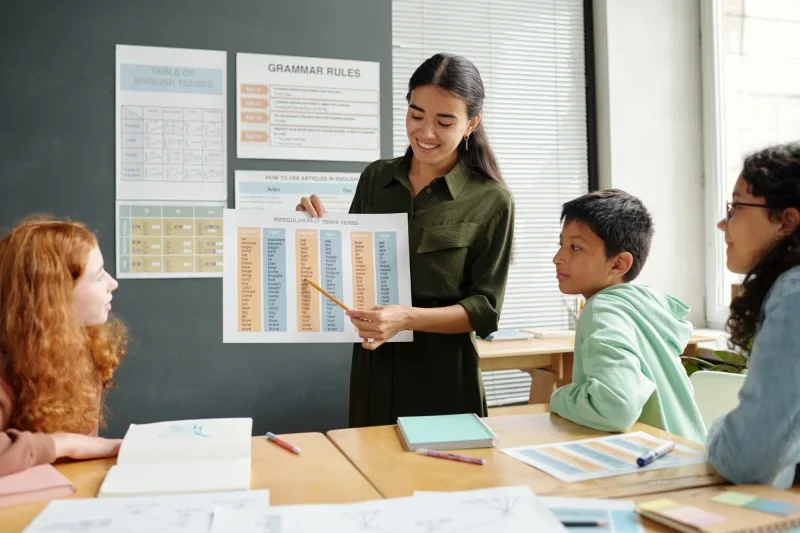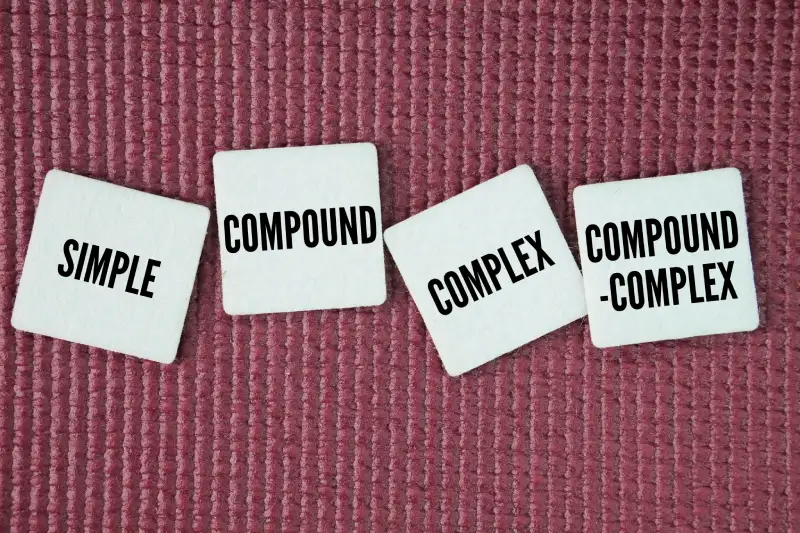Di dalam bahasa Inggris selain grammar, materi yang tidak kalah penting untuk dikuasai adalah tenses.
Tenses dalam bahasa Inggris merupakan aturan tata bahasa yang menunjukkan waktu terjadinya suatu peristiwa, di masa lalu, sekarang, atau masa depan.
Dengan menguasai tenses kita bisa menyusun kalimat dengan tepat sehingga pesan yang disampaikan mudah dipahami oleh lawan bicara.
Mari simak artikel di bawah ini untuk mengetahui lebih lanjut!
- Apa Itu Tenses?
- Pentingnya Tenses dalam Bahasa Inggris
- Jenis-jenis Tenses dalam Bahasa Inggris
- 1. Simple Present Tense
- 2. Present Continuous Tense
- 3. Present Perfect Tense
- 4. Present Perfect Continuous Tense
- 5. Simple Past Tense
- 6. Past Continuous Tense
- 7. Past Perfect Tense
- 8. Past Perfect Continuous Tense
- 9. Simple Future Tense
- 10. Future Continuous Tense
- 11. Future Perfect Tense
- 12. Future Perfect Continuous Tense
- 13. Past Future Tense (Simple)
- 14. Past Future Continuous Tense
- 15. Past Future Perfect Tense
- 16. Past Future Perfect Continuous Tense
Apa Itu Tenses?
Tenses adalah bentuk kata kerja dalam bahasa Inggris yang digunakan untuk menunjukkan keterangan waktu suatu peristiwa, apakah di masa lalu, masa sekarang, atau masa depan.
Dengan menggunakan tenses, kita dapat mengungkapkan kapan suatu peristiwa berlangsung, apakah di masa kini, masa lalu, atau masa depan sesuai dengan waktu kejadiannya.
Pentingnya Tenses dalam Bahasa Inggris
Menguasai tenses penting karena beberapa alasan berikut ini:
- Menunjukkan waktu kejadian: Kita dapat menyampaikan kapan suatu aksi terjadi, apakah sekarang, sudah terjadi di masa lalu, atau akan terjadi di masa depan.
- Meningkatkan kemampuan komunikasi: Percakapan menjadi lebih natural dan tepat.
- Mencegah salah pengertian: Penggunaan tenses yang benar membuat pesan tersampaikan dengan jelas.
Baca Juga: 9 Jenis Part of Speech dan Contoh Lengkapnya
Jenis-jenis Tenses dalam Bahasa Inggris
Tenses dibagi menjadi beberapa kelompok utama berdasarkan waktu kejadian, yaitu Present Tenses, Past Tenses, Future Tenses, dan Future in the Past Tenses. Berikut penjelasan lengkapnya:
Present Tenses
1. Simple Present Tense
Simple Present Tense digunakan untuk menyatakan kebiasaan, fakta umum, dan kejadian yang berulang.
| Tipe Kalimat | Rumus | Contoh |
| + | Subject + Verb 1 (s/es) | She reads books every day. |
| – | Subject + do/does + not + Verb 1 | She does not read books every day. |
| ? | Do/Does + Subject + Verb 1? | Does she read books every day? |
2. Present Continuous Tense
Present Continuous Tense digunakan untuk aksi yang sedang berlangsung saat ini.
| Tipe Kalimat | Rumus | Contoh |
| + | Subject + am/is/are + Verb-ing | They are watching TV now. |
| – | Subject + do/does + not + Verb 1 | She is not sleeping at the moment. |
| ? | Am/Is/Are + Subject + Verb-ing? | Are you studying English? |
3. Present Perfect Tense
Present Perfect Tense menunjukkan aksi yang telah selesai pada waktu yang tidak spesifik sebelum sekarang.
| Tipe Kalimat | Rumus | Contoh |
| + | Subject + have/has + V3 | I have finished my homework. |
| – | Subject + have/has + not + V3 | She has not seen that movie.. |
| ? | Have/Has + Subject + V3 | Have you eaten dinner? |
4. Present Perfect Continuous Tense
Present Perfect Continuous Tense menggambarkan aksi yang dimulai di masa lalu dan masih berlangsung hingga sekarang.
| Tipe Kalimat | Rumus | Contoh |
| + | Subject + am/is/are + Verb-ing | She has been studying for three hours. |
| – | Subject + do/does + not + Verb 1 | They have not been working here long. |
| ? | Am/Is/Are + Subject + Verb-ing? | Have you been waiting long? |
Past Tenses
5. Simple Past Tense
Simple past tense digunakan untuk menyatakan kejadian yang sudah selesai di masa lalu.
| Tipe Kalimat | Rumus | Contoh |
| + | Subject + V2 | We visited Bali last year. |
| – | Subject + did not + V1 | He did not go to school yesterday. |
| ? | Did + Subject + V1 | Did you watch the movie last night? |
6. Past Continuous Tense
Past continuous tense menggambarkan aksi yang sedang berlangsung pada waktu tertentu di masa lalu.
| Tipe Kalimat | Rumus | Contoh |
| + | Subject + was/were + V-ing | I was reading when she came. |
| – | Subject + was/were + not + V-ing | They were not playing football. |
| ? | Was/Were + Subject + V-ing | Were you sleeping at 10 p.m.? |
7. Past Perfect Tense
Past perfect tense menunjukkan aksi yang sudah selesai sebelum kejadian lain di masa lalu.
| Tipe Kalimat | Rumus | Contoh |
| + | Subject + had + V3 | She had left before I arrived. |
| – | Subject + had not + V3 | He had not finished his work. |
| ? | Had + Subject + V3 | Had they eaten before the meeting? |
8. Past Perfect Continuous Tense
Past perfect continuous tense menggambarkan aksi yang sudah berlangsung cukup lama sebelum kejadian lain di masa lalu.
| Tipe Kalimat | Rumus | Contoh |
| + | Subject + had + been + V-ing | He had been working for five years before he moved. |
| – | Subject + had not + been + V-ing | She had not been studying enough. |
| ? | Had + Subject + been + V-ing | Had you been waiting long before the bus arrived? |
Future Tenses
9. Simple Future Tense
Simple future tense digunakan untuk menyatakan rencana, niat, atau prediksi.
| Tipe Kalimat | Rumus | Contoh |
| + | Subject + will + V1 | I will call you tomorrow. |
| – | Subject + will not + V1 | He will not join the party. |
| ? | Will + Subject + V1 | Will you visit her next week? |
10. Future Continuous Tense
Future continuous tense menggambarkan aksi yang akan sedang berlangsung di waktu tertentu di masa depan.
| Tipe Kalimat | Rumus | Contoh |
| + | Subject + will + be + V-ing | This time tomorrow, I will be flying to Japan. |
| – | Subject + will not + be + V-ing | They will not be working at night. |
| ? | Will + Subject + be + V-ing | Will she be studying at 9 p.m.? |
Baca Juga: Apa Perbedaan Will dan Going To dan Bagaimana Contohnya?
11. Future Perfect Tense
Future perfect tense menunjukkan aksi yang akan sudah selesai sebelum waktu tertentu di masa depan.
| Tipe Kalimat | Rumus | Contoh |
| + | Subject + will + have + V3 | By 2026, I will have graduated. |
| – | Subject + will not + have + V3 | He will not have finished by then. |
| ? | Will + Subject + have + V3 | Will you have completed the project by Friday? |
12. Future Perfect Continuous Tense
Future perfect continuous tense menggambarkan aksi yang akan sudah berlangsung selama periode waktu tertentu di masa depan.
| Tipe kalimat | Rumus | Contoh |
| + | Subject + will + have + been + V-ing | By next month, she will have been working here for two years. |
| – | Subject + will not + have + been + V-ing | He will not have been living there long. |
| ? | Will + Subject + have + been + V-ing | Will they have been studying for five hours by noon? |
Baca Juga: Perbedaan Do, Does, Did, dan Done: Fungsi, Rumus, dan Contoh
Future In The Past (Past Future Tenses)
13. Past Future Tense (Simple)
Past future tense digunakan untuk menyatakan sesuatu yang akan terjadi, dilihat dari sudut pandang masa lalu.
| Tipe Kalimat | Rumus | Contoh |
| + | Subject + would + V1 | He said he would help me. |
| – | Subject + would not + V1 | She said she would not join us. |
| ? | Would + Subject + V1 | Would you go if she invited you? |
14. Past Future Continuous Tense
Menunjukkan aksi yang akan sedang berlangsung di masa depan dari sudut pandang masa lalu.
| Tipe Kalimat | Rumus | Contoh |
| + | Subject + would + be + V-ing | They said they would be staying at the hotel. |
| – | Subject + would not + be + V-ing | He said he would not be working late. |
| ? | Would + Subject + be + V-ing | Would she be waiting for us? |
15. Past Future Perfect Tense
Menggambarkan aksi yang akan sudah selesai di masa depan, dilihat dari masa lalu.
| Tipe Kalimat | Rumus | Contoh |
| + | Subject + would + have + V3 | She thought she would have finished by now. |
| – | Subject + would not + have + V3 | He said he would not have completed the task. |
| ? | Would + Subject + have + V3 | Would they have arrived by 8 o’clock? |
16. Past Future Perfect Continuous Tense
Menunjukkan aksi yang akan sudah berlangsung untuk periode tertentu, dari sudut pandang masa lalu.
| Tipe kalimat | Rumus | Contoh |
| + | Subject + would + have + been + V-ing | He said he would have been working here for five years by 2020. |
| – | Subject + would not + have + been + V-ing | She said she would not have been living there long. |
| ? | Would + Subject + have + been + V-ing | Would you have been waiting for two hours if the train had not arrived? |
Baca Juga: 4 Tipe Conditional Sentence Lengkap dengan Contohnya
Memahami tenses dalam bahasa Inggris sangat penting untuk menyampaikan informasi secara akurat dan efektif sesuai dengan waktu kejadian.
Mempelajari tenses bisa terlihat sulit namun di Sparks English, tempat les bahasa Inggris untuk anak hingga remaja, hal ini bisa sangat menyenangkan dan mudah dipahami.
Menggunakan pendekatan menyesuaikan usia anak dan dibimbing langsung oleh guru profesional sampai native speaker, menguasai bahasa Inggris sejak dini bukan lagi mimpi.
Yuk, coba kelas trial gratis di Sparks English untuk merasakan atmosfer pembelajaran yang fun dan berkualitas.






